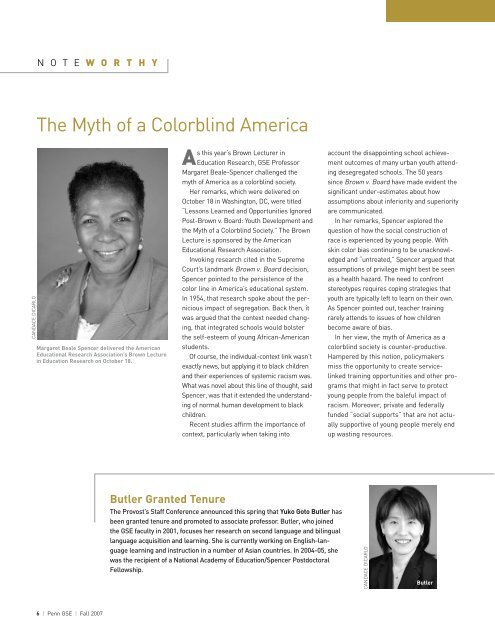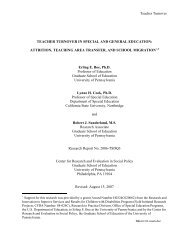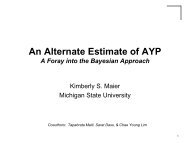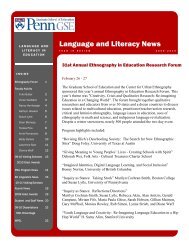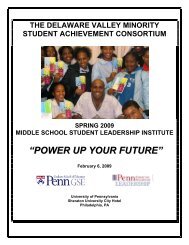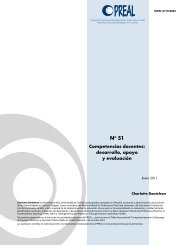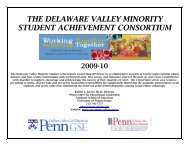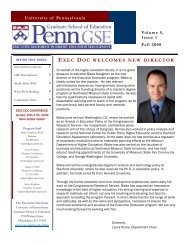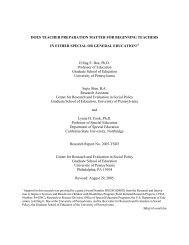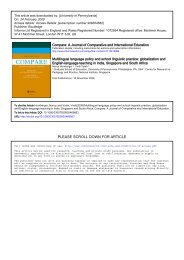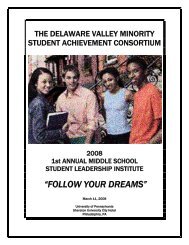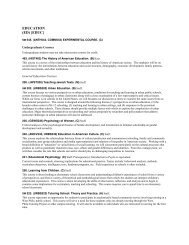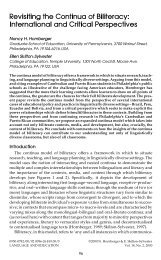C1 Cover_S06.qxd - Penn GSE - University of Pennsylvania
C1 Cover_S06.qxd - Penn GSE - University of Pennsylvania
C1 Cover_S06.qxd - Penn GSE - University of Pennsylvania
Create successful ePaper yourself
Turn your PDF publications into a flip-book with our unique Google optimized e-Paper software.
CANDACE DICARLO<br />
N O T E W O R T H Y<br />
The Myth <strong>of</strong> a Colorblind America<br />
Margaret Beale Spencer delivered the American<br />
Educational Research Association’s Brown Lecture<br />
in Education Research on October 18.<br />
6 | <strong>Penn</strong> <strong>GSE</strong> | Fall 2007<br />
Butler Granted Tenure<br />
As this year’s Brown Lecturer in<br />
Education Research, <strong>GSE</strong> Pr<strong>of</strong>essor<br />
Margaret Beale-Spencer challenged the<br />
myth <strong>of</strong> America as a colorblind society.<br />
Her remarks, which were delivered on<br />
October 18 in Washington, DC, were titled<br />
“Lessons Learned and Opportunities Ignored<br />
Post-Brown v. Board: Youth Development and<br />
the Myth <strong>of</strong> a Colorblind Society.” The Brown<br />
Lecture is sponsored by the American<br />
Educational Research Association.<br />
Invoking research cited in the Supreme<br />
Court’s landmark Brown v. Board decision,<br />
Spencer pointed to the persistence <strong>of</strong> the<br />
color line in America’s educational system.<br />
In 1954, that research spoke about the pernicious<br />
impact <strong>of</strong> segregation. Back then, it<br />
was argued that the context needed changing,<br />
that integrated schools would bolster<br />
the self-esteem <strong>of</strong> young African-American<br />
students.<br />
Of course, the individual-context link wasn’t<br />
exactly news, but applying it to black children<br />
and their experiences <strong>of</strong> systemic racism was.<br />
What was novel about this line <strong>of</strong> thought, said<br />
Spencer, was that it extended the understanding<br />
<strong>of</strong> normal human development to black<br />
children.<br />
Recent studies affirm the importance <strong>of</strong><br />
context, particularly when taking into<br />
The Provost’s Staff Conference announced this spring that Yuko Goto Butler has<br />
been granted tenure and promoted to associate pr<strong>of</strong>essor. Butler, who joined<br />
the <strong>GSE</strong> faculty in 2001, focuses her research on second language and bilingual<br />
language acquisition and learning. She is currently working on English-language<br />
learning and instruction in a number <strong>of</strong> Asian countries. In 2004-05, she<br />
was the recipient <strong>of</strong> a National Academy <strong>of</strong> Education/Spencer Postdoctoral<br />
Fellowship.<br />
account the disappointing school achievement<br />
outcomes <strong>of</strong> many urban youth attending<br />
desegregated schools. The 50 years<br />
since Brown v. Board have made evident the<br />
significant under-estimates about how<br />
assumptions about inferiority and superiority<br />
are communicated.<br />
In her remarks, Spencer explored the<br />
question <strong>of</strong> how the social construction <strong>of</strong><br />
race is experienced by young people. With<br />
skin color bias continuing to be unacknowledged<br />
and “untreated,” Spencer argued that<br />
assumptions <strong>of</strong> privilege might best be seen<br />
as a health hazard. The need to confront<br />
stereotypes requires coping strategies that<br />
youth are typically left to learn on their own.<br />
As Spencer pointed out, teacher training<br />
rarely attends to issues <strong>of</strong> how children<br />
become aware <strong>of</strong> bias.<br />
In her view, the myth <strong>of</strong> America as a<br />
colorblind society is counter-productive.<br />
Hampered by this notion, policymakers<br />
miss the opportunity to create servicelinked<br />
training opportunities and other programs<br />
that might in fact serve to protect<br />
young people from the baleful impact <strong>of</strong><br />
racism. Moreover, private and federally<br />
funded “social supports” that are not actually<br />
supportive <strong>of</strong> young people merely end<br />
up wasting resources.<br />
CANDACE DICARLO<br />
Butler


